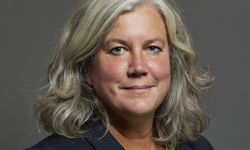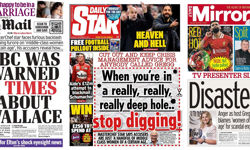When I became a regional newspaper editor 26 years ago, I joined a band of demi-gods. They were men (yes, all men) such as Alex Leys, Sean Dooley, Mike Lowe, Allan Prosser, Barrie Williams and Graeme Stanton who prowled the industry with colossal self-belief. They answered to almost no-one except their readers and they often terrorised the management, lesser beings from accounts and sales. "You are just a van driver in a suit,” is how I recall one exchange with an MD.
The big beasts had massive budgets, plenty of staff … and power. All worked hard and some played hard. Proprietors believed in newspapers and a strong editor was the key to a thriving business.
Neil Hodgkinson was around in those days. "My first editors seemed to spend most of the time in the pub with a few 'sermons from the mount' issued from time to time. The editor was someone you didn't approach. There was an unwritten, almost forelock-touching, respect. There were also a lot of deputy, assistant and associate editor layers between us."
Today, being an editor is very different. The change in economics, the reduced resources, the drive to digital, the need to maintain profits and uncertainty over the viability of print have had a deep impact. Nowhere have the changes been more marked than in Northcliffe. Once the editors answered only to revered chief executive Ian Park, himself a journalist. But over the years, their power was eroded. They found themselves accountable to local publishers. Then along came David Montgomery, who called editors 'content managers'. Now Trinity Mirror is in charge and many of the old guard have moved on.
So the editors have definitely changed … but has the job? When I trained editors, I would begin with a definition: The job is simple. Set a vision for your newspaper and give your people the knowledge, skills, guidance and tools to deliver it. That’s it.
But is that still relevant? Do editors have the authority to draft a vision? Does a vision even exist? Or is there just a centralised strategy that is thrust upon them?
Today’s editors are no longer the untouchables but have they really just become administrators? Do they still edit? Has their status diminished? I asked these questions to seven experienced editors. Some wouldn’t go on the record which, while understandable, is in itself a reflection of the change.
A diminished role?
So, let’s cut to the quick. Has the editor's role diminished? “Undoubtedly,” a long-standing daily editor told me. "Editorial quality and standards have dropped down the list of priorities. It is much more about what drives revenue (click-bait being the most worrying example). Editors who leave are being replaced on much smaller salaries which says it all.”
Another agreed: "We are managers first and editors second. What impacts is the relentless nature of managing decline and implementing cost cuts.”
In 1992, Malcolm Warne took over one newspaper, the Darlington and Stockton Times. When he left last year, he was editing eight newspapers, a magazine and their websites. So had his status diminished? “In a couple of senses, no,” he said. "Within the company, the additional responsibility enhanced my status and I don't think the wider community thought less of me. But generally, the role of editor is being progressively de-skilled and devalued."
Simon O’Neill, who left the Oxford Mail last year after editing daily titles for seventeen years, said: "Internally, we have become accountable to more people. We are accountable to digital, to analytics and commercially. Performance is no longer tracked by half-year figures, it is tracked hourly. Editors are no longer gods. But perhaps that is no bad thing."
The Liverpool Echo’s Alastair Machray has been editing since the mid-nineties and believes editors are as respected as they ever were both in and out of the industry: "The need to act as an ambassador has never been more vital. The need to manage resources prudently means editors are a crucial link in the publication chain."
Ian Murray, editor of the Southern Daily Echo, has seen his responsibilities grow massively. As editor-in-chief of Newsquest’s titles in Hampshire and Berkshire, he is in charge of twelve titles, and certainly isn’t suffering from a diminishing status. He said: "At its heart, I don't believe the editor's role has changed. In my experience, the editor has not yet become just another manager of a department.”
So what have been the main changes?
Doing more with less
By far the biggest has been having to do more with less. It is all hands to the pump these days, including the editor’s. One said, the biggest change was he became more hands-on because the subbing layer had been removed. "Instead of looking over shoulders and guiding, I was largely doing it.”
Machray agreed. "Resource can be tight so you have to get down and dirty with the content. Perhaps in the good old days, too many editors 'helicoptered' too much!"
But some editors believed ‘doing more with less’ was wearing them down.
One said: "It is difficult to maintain quality with diminishing resource and an increasing workload. That hurts your editorial pride and few editors can sustain their enthusiasm. I fear we are losing tremendous talent and experience at a time we need it most.”
Another said: "You find yourself running faster and faster to try to edit in the way you think is needed to maintain the standards. The bottom line is that you can't produce the same standards with half the staff.”
The other seismic change has been taking responsibility for digital. Editors steeped in newsprint have had to adapt to different ways of story-telling … and not all are naturals. They have to think about new audiences, recruit staff versed in social media, increase the pace and output and put some values to one side.
Commercial accountability
Another change has been commercial accountability. In my day, I would throw out ‘unsuitable’ adverts. Now, editors have to accept the ‘creative’ ad shapes and wraparounds. It is, after all, a battle for survival. It means more power has shifted to the commercial department … another chip away at the editor’s status.
Machray said: "The modern editor must support commercial goals when revenues are under pressure but must find ways of doing so without crossing the boundaries of editorial integrity. It's always been that way, but it's harder these days with revenues under so much pressure.”
And then there is the audience. It has changed massively from the days when loyal readers had their newspapers delivered each day. Now, it is fickle … and often angry.
Hodgkinson said: "The world has become full of trolls; the instant judge and jury and the downright evil commentator. Social media has let this genie out of the bottle. I suspect these people always existed but writing a letter probably put them off. Their mum also probably told them off! Now, the bedroom warriors are everywhere and reaction is there within seconds. A thick skin is much-needed. People in the industry are also very critical. I don’t know what made them so miserable but I wish they'd offer more support to those battling the challenges of modern journalism, especially the youngsters."
When I ran the editors' seminars, we drew up a job description. The headers were: journalist, sales executive, business person, ambassador, strategist, recruitment specialist, lawyer and ethical guide, accountant, communications expert, teacher, technology expert, manager, administrator and leader. The priorities have been shuffled - but those qualities are still what editors need. The question is, do companies give editors the time and the training to develop their skills properly? My seven editors are all long enough in the tooth to have those disciplines … but they worry about the next generation.
Having fun?
So one final question - do you enjoy editing as much as you used to? Most of those who had left said definitely not. One told me: “No, I didn't enjoy it towards the end - which is why I got off the hamster wheel.”
Warne agreed: "Absolutely not! I loved that paper but I felt I was producing a sub-standard product because I was spread too thinly. It's demoralising to pick up the paper and think this could have been so much better."
Machray was more circumspect: "Yes and No. I enjoy the challenge of change and it is a remarkable honour to be in a position of influence as the industry transitions from print to digital. I don't enjoy having to reduce numbers and let staff go. Anyone who does enjoy it should be ashamed.
"I often know I'd enjoy it more if I could really chuck some resource at things that get me excited. That can be frustrating … then along comes a story like the Hillsborough inquests verdict and I remember what it is about and why we are privileged to do what we do. That's when I give my head a shake and stop feeling sorry for myself.”
O'Neill has moved on but said: "It is still a fantastic, privileged job and good, experienced editors with the right skills are still vital.”
Hodgkinson was even more positive. "I have always said the day I wake up not wanting to go to work, I will quit. Just walk away. No PR, no hanging on. 37 years on, it has never happened. Long may that continue."
The regional editor’s chair is no longer occupied by the big beasts of yesteryear. Today’s incumbents are, with a few exceptions, paid less, accountable to more people, have their performance scrutinised hourly and have to work with dwindling resources. But make no mistake, the job has always been tough and challenging. It has always needed robust, committed and skilled characters. And that isn’t going to change.












